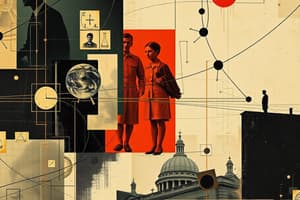Podcast
Questions and Answers
Based on the provided text, explain what is meant by the statement that "the actual commission of the robbery is a historical fact no longer available to direct observation."
Based on the provided text, explain what is meant by the statement that "the actual commission of the robbery is a historical fact no longer available to direct observation."
- Direct observation is impossible because the police have not yet investigated the scene.
- Since the robbery is a matter of legal record, direct observation is not necessary to determine the truth.
- The robbery victims are unable to provide testimony about the event, making direct observation impossible.
- The robbery, as a past event, cannot be observed directly because it happened in the past. (correct)
The analogy of the robbed safe is used to demonstrate what key concept about logic?
The analogy of the robbed safe is used to demonstrate what key concept about logic?
- The legal system relies heavily on logical arguments presented by both prosecution and defense.
- Logical inferences are made from existing facts, which are not always directly observable. (correct)
- Direct observation is the most reliable method for gathering evidence in a criminal case.
- Fingerprints are the most conclusive evidence in a robbery investigation.
In the provided text, what is the primary function of the prosecutor's argument in court?
In the provided text, what is the primary function of the prosecutor's argument in court?
- To determine the specific time of the robbery based on the fingerprints.
- To ensure that Brown's rights during the investigation are upheld.
- To introduce evidence that supports the conclusion that Brown committed the robbery. (correct)
- To assess the reliability of the fingerprints found on the safe.
What is the key difference between the prosecutor's argument and the defense attorney's argument regarding the presence of Brown's fingerprints on the safe?
What is the key difference between the prosecutor's argument and the defense attorney's argument regarding the presence of Brown's fingerprints on the safe?
Which of the following scenarios would be most similar to the robbery example provided in the text regarding the limitations of direct observation?
Which of the following scenarios would be most similar to the robbery example provided in the text regarding the limitations of direct observation?
What is the role of logic in how individuals perceive the world?
What is the role of logic in how individuals perceive the world?
Which statement best summarizes the main point of the text in relation to logic?
Which statement best summarizes the main point of the text in relation to logic?
What is the primary implication of the illustration about Tamara and the window ledge?
What is the primary implication of the illustration about Tamara and the window ledge?
What does the statement "Being rational involves trying to understand and interpret other people's actions and inactions based on present, past and future situations" suggest?
What does the statement "Being rational involves trying to understand and interpret other people's actions and inactions based on present, past and future situations" suggest?
According to the provided text, what is the central ethical issue in advanced writing?
According to the provided text, what is the central ethical issue in advanced writing?
What is the core argument concerning plagiarism in the text?
What is the core argument concerning plagiarism in the text?
Which of the following best reflects the connection between 'inferences' and 'rationality' as discussed in the text?
Which of the following best reflects the connection between 'inferences' and 'rationality' as discussed in the text?
Which of the following situations would best illustrate the concept of 'understanding rationality' as described in the text?
Which of the following situations would best illustrate the concept of 'understanding rationality' as described in the text?
Based on the text, why are ethical issues particularly critical in advanced writing?
Based on the text, why are ethical issues particularly critical in advanced writing?
What is the main point the text makes about the relationship between a person's actions and their intentions?
What is the main point the text makes about the relationship between a person's actions and their intentions?
The text implies that ethical issues in advanced writing are "transcendent." What does this mean?
The text implies that ethical issues in advanced writing are "transcendent." What does this mean?
What is the primary ethical violation described in academic writing?
What is the primary ethical violation described in academic writing?
Which of the following is NOT a consequence of plagiarism mentioned?
Which of the following is NOT a consequence of plagiarism mentioned?
In the context of preventing plagiarism, what is highlighted as an important practice for writers?
In the context of preventing plagiarism, what is highlighted as an important practice for writers?
What form of academic dishonesty involves copying someone’s work verbatim without citation?
What form of academic dishonesty involves copying someone’s work verbatim without citation?
What might happen to a student who has repeated instances of plagiarism?
What might happen to a student who has repeated instances of plagiarism?
Which of the following statements BEST describes the ethical dilemma associated with the use of data in advanced writing?
Which of the following statements BEST describes the ethical dilemma associated with the use of data in advanced writing?
What is the primary ethical concern regarding cultural sensitivity in advanced writing?
What is the primary ethical concern regarding cultural sensitivity in advanced writing?
What is the MAIN responsibility of an advanced writer in upholding ethical standards?
What is the MAIN responsibility of an advanced writer in upholding ethical standards?
Which of the following actions BEST demonstrates the ethical principle of respecting intellectual property in advanced writing?
Which of the following actions BEST demonstrates the ethical principle of respecting intellectual property in advanced writing?
What is the significance of stating potential conflicts of interest in advanced writing?
What is the significance of stating potential conflicts of interest in advanced writing?
Which of the following is NOT an ethical issue discussed in the text as it relates to advanced writing?
Which of the following is NOT an ethical issue discussed in the text as it relates to advanced writing?
What is the primary goal of fostering inclusivity in advanced writing?
What is the primary goal of fostering inclusivity in advanced writing?
Which of the following BEST illustrates the ethical principle of transparency in advanced writing?
Which of the following BEST illustrates the ethical principle of transparency in advanced writing?
How does the text define plagiarism in the context of advanced writing?
How does the text define plagiarism in the context of advanced writing?
What is the MOST important ethical principle that advanced writers should strive to uphold?
What is the MOST important ethical principle that advanced writers should strive to uphold?
What is the primary ethical concern associated with plagiarism?
What is the primary ethical concern associated with plagiarism?
Selective reporting in writing can lead to which of the following ethical concerns?
Selective reporting in writing can lead to which of the following ethical concerns?
Why is cultural sensitivity important in written content?
Why is cultural sensitivity important in written content?
What does responsible use of data prevent in writing?
What does responsible use of data prevent in writing?
What ethical concern arises from failing to disclose conflicts of interest?
What ethical concern arises from failing to disclose conflicts of interest?
Copyright infringement primarily addresses issues related to which of the following?
Copyright infringement primarily addresses issues related to which of the following?
What is a crucial action writers must take to uphold copyright ethics?
What is a crucial action writers must take to uphold copyright ethics?
What contemporary challenge related to copyright issues is mentioned?
What contemporary challenge related to copyright issues is mentioned?
What can result from failing to acknowledge original creators in writing?
What can result from failing to acknowledge original creators in writing?
Which of the following is NOT a recognized ethical concern in writing according to the given content?
Which of the following is NOT a recognized ethical concern in writing according to the given content?
Flashcards
Logic
Logic
The study of correct reasoning and inference.
Inference
Inference
The process of drawing conclusions from premises or facts.
Propositions
Propositions
Statements that can be true or false.
Direct Observation
Direct Observation
Signup and view all the flashcards
Historical Fact
Historical Fact
Signup and view all the flashcards
Circumstantial Evidence
Circumstantial Evidence
Signup and view all the flashcards
Logical Conclusion
Logical Conclusion
Signup and view all the flashcards
Rationality
Rationality
Signup and view all the flashcards
Intentions
Intentions
Signup and view all the flashcards
Social Norms
Social Norms
Signup and view all the flashcards
Ethical Writing
Ethical Writing
Signup and view all the flashcards
Plagiarism
Plagiarism
Signup and view all the flashcards
Communication Effects
Communication Effects
Signup and view all the flashcards
Inquiry
Inquiry
Signup and view all the flashcards
Moral Considerations
Moral Considerations
Signup and view all the flashcards
Digital Copyright
Digital Copyright
Signup and view all the flashcards
Consequences of Plagiarism
Consequences of Plagiarism
Signup and view all the flashcards
Academic Warning
Academic Warning
Signup and view all the flashcards
Academic Integrity
Academic Integrity
Signup and view all the flashcards
Ethical Standards in Writing
Ethical Standards in Writing
Signup and view all the flashcards
Proper Use of Data
Proper Use of Data
Signup and view all the flashcards
Misrepresentation
Misrepresentation
Signup and view all the flashcards
Selective Reporting
Selective Reporting
Signup and view all the flashcards
Conflict of Interest
Conflict of Interest
Signup and view all the flashcards
Cultural Sensitivity
Cultural Sensitivity
Signup and view all the flashcards
Inclusion in Writing
Inclusion in Writing
Signup and view all the flashcards
Transparency in Writing
Transparency in Writing
Signup and view all the flashcards
Ethical Communication
Ethical Communication
Signup and view all the flashcards
Responsible Use of Data
Responsible Use of Data
Signup and view all the flashcards
Copyright
Copyright
Signup and view all the flashcards
Copyright Infringement
Copyright Infringement
Signup and view all the flashcards
Citation
Citation
Signup and view all the flashcards
Online Piracy
Online Piracy
Signup and view all the flashcards
Ethical Dilemmas
Ethical Dilemmas
Signup and view all the flashcards
Study Notes
Logic and Critical Thinking
- Logic is the study of correct inferences; determining truth or falsity of propositions.
- Human ability to logically infer truth/falsity is crucial for perception of happenings.
- Direct observation isn't always possible; inference from existing facts is needed.
- E.g., if fingerprints on a safe match suspect's, it suggests they robbed it.
- Rationality involves interpreting others' actions based on present, past, and future.
- Inferring Tamara's intentions - cleaning window, rescuing, or suicide - requires understanding context.
Ethical Considerations in Advanced Writing
- Ethical considerations in advanced writing encompass moral principles for producing, distributing, and receiving information.
- Plagiarism is a serious ethical concern, where another's work is presented as one's own.
- Proper use of data and research is crucial, avoiding misrepresentation and selective reporting.
- Addressing conflicts of interest by appropriately disclosing potential biases in academic writing is essential.
- Cultural sensitivity and inclusiveness are vital, avoiding stereotypes and prejudice in writing.
- Responsible use of data involves transparent and accurate presentation, without manipulation.
- Conflict of interest issues can compromise credibility; avoiding bias is key.
Copyright in Advanced Writing
- Copyright issues are significant in advanced writing involving legal protection of original work (reproduction, distribution, display).
- Writers must be vigilant not to infringe copyrights through improper citation or failure to obtain necessary permissions.
- Copy-paste plagiarism, paraphrasing without attribution, patchwriting, and self-plagiarism are all forms of academic dishonesty.
- Plagiarism's consequences can vary, from warnings to failing a course, to suspension or expulsion.
Studying That Suits You
Use AI to generate personalized quizzes and flashcards to suit your learning preferences.




